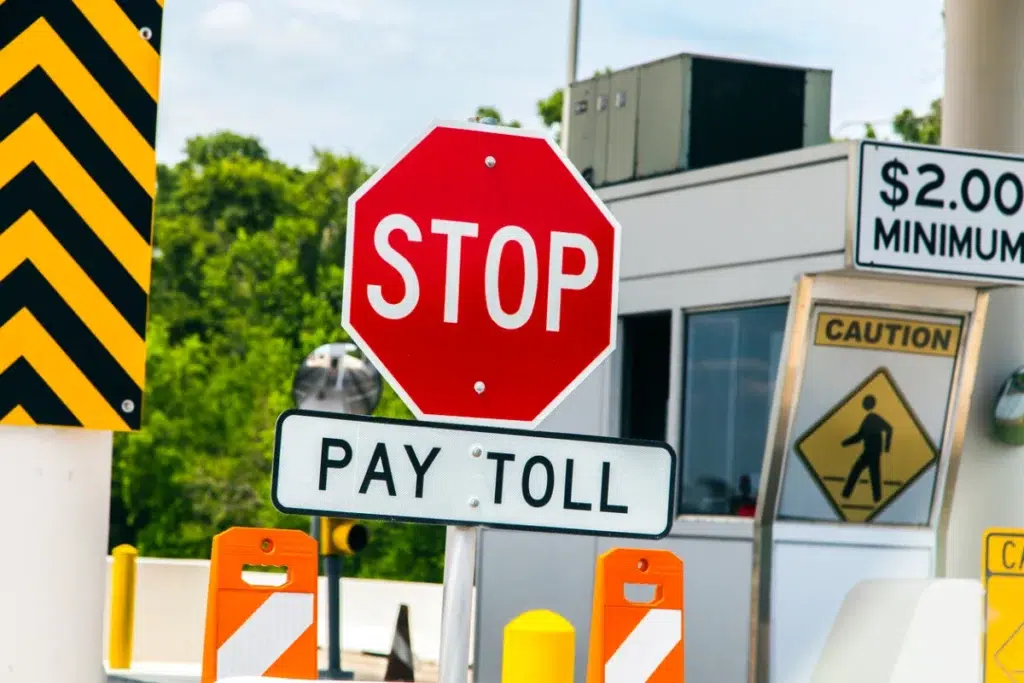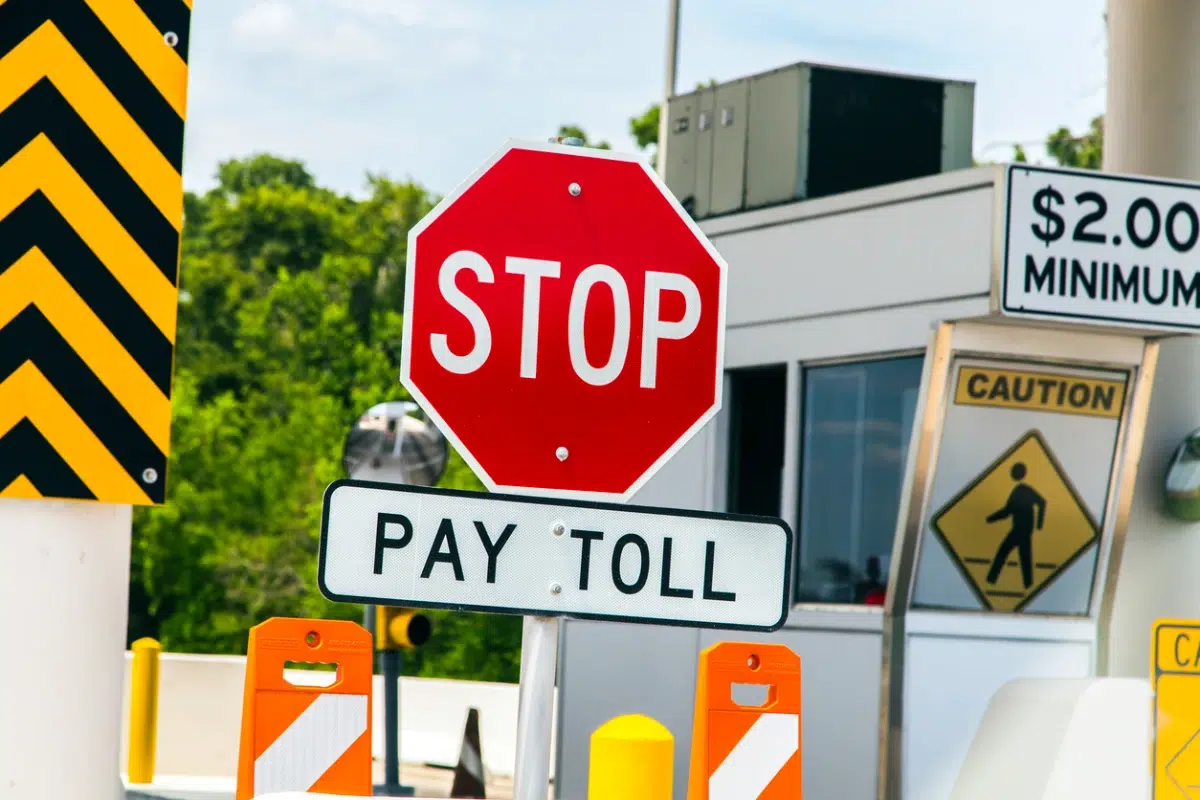
Florida has more toll roads than any other state. The state has over 700 miles of roads with required toll fees. When a driver fails to pay a toll, the state has mechanisms for enforcing the toll violation.
What happens if you don’t pay tolls in Florida? The good news is that toll violations are noncriminal, moving violations. The bad news is that the state can use administrative actions, such as suspending a vehicle’s registration and turning the debt over to a collection agency, to collect unpaid tolls.
A lawyer can often provide unpaid toll citation help in Florida by negotiating the fines or challenging the ticket.
How Florida’s Toll Payment Systems Track and Charge Drivers
Florida’s toll roads are operated by two primary agencies. Florida’s Turnpike Enterprise is part of the Florida Department of Transportation. It handles the Florida Turnpike and operates the SunPass transponder system.
The Central Florida Expressway Authority (CFX) operates toll roads in Orange, Osceola, Brevard, Seminole, and Lake Counties. This system includes many of the toll roads that serve the Orlando resorts. It also includes several roads that run to the beaches. The following expressways fall under the jurisdiction of CFX:
- FL-408
- FL-414
- FL-417
- FL-429
- FL-453
- FL-528
- FL-538
CFX also manages the E-Pass system.
These systems use three primary methods for tracking and charging drivers.
Toll Booths
Most toll roads in Florida are cashless. However, the following roads still include a staffed toll facility where a driver can pay a toll using cash or a payment card:
- FL-281’s Garcon Point Bridge
- FL-528, also called the Beachline West
- I-75 at Alligator Alley
- I-275’s Sunshine Skyway Bridge
Toll booths track and charge drivers using physical or electronic gates. Many visitors and truck drivers choose to use toll booths because they lack the necessary toll transponder or need a receipt.
Toll by Plate
Most toll points in Florida include a camera to capture each vehicle’s license plate as it passes. Specifically, cameras capture the front and rear bumpers and use software to read the vehicle’s license plate number.
The state mails a toll-by-plate invoice to the address on the vehicle’s registration. This toll enforcement invoice does not mean you committed a toll violation. If you do not have a toll transponder, this toll-by-plate mailing is how the state collects the toll fee.
Please make special note of the use by the Toll Authority of the address on the vehicle’s registration and not the address on your driver’s license. Vehicle registrations are maintained by the tax collector’s office and Florida Driver’s Licenses are maintained by the FLHSMV. These agencies do not speak with each other, so if you moved and updated your driver’s license address but did not update your registration address, the notices will go to your old address, placing you in jeopardy of missing the notices.
E-Pass and SunPass Accounts
Toll transponders issued by the E-Pass and SunPass Systems contain a transmitter. The transmitter broadcasts the owner’s prepaid account number. As the vehicle passes through toll points, readers collect the account number and debit the toll fees. When the balance owed causes the owner’s account to drop below a set threshold, the system automatically replenishes the account.
These systems work for both Florida-specific E-Pass and SunPass customers as well as out-of-state visitors with EZ-Pass, NC Quick Pass, Peach Pass, and other transponders.
The main difference between toll-by-plate and toll transponders is that the state includes administrative fee amounts when it mails a toll enforcement invoice. The amounts automatically debited by the transponder systems do not include these fees.
Miss a Toll? Here’s What Happens Next
You can miss a toll in a few ways. First, there might be a problem with your electronic tolling account. You might not have enough money on the payment card linked to your toll transponder. If the account cannot auto-replenish, you will rack up unpaid tolls.
Similarly, your card information might be outdated. For example, you might have received a new card with a different expiration date. In either case, you will receive a toll enforcement invoice for any accumulated tolls.
You may also receive a toll notice if your transponder malfunctioned. Older transponders that included a battery would malfunction when the battery died. Newer transponders do not contain a battery. Instead, they use the radio waves broadcast at the toll point to power the transmitter.
However, they can still malfunction if they fail to transmit the account information or the toll point fails to receive it. When this happens, the agency responsible for the toll road will mail a bill to the address associated with your license plate.
Again, neither of these situations constitutes a failure to pay that will result in a toll violation notice. Instead, you were not able to use your prepaid tolling account, and the state was forced to use the license plate system to collect the toll. You will be charged the toll plus the administrative fee without any other fines or fees.
You do commit a violation if the toll bill goes unpaid. This sometimes happens without any intent. For example, the address associated with your license plate might be wrong. You might forget about the bill or assume someone else in your household paid it.
Regardless of your intent, the state will send a second collection notice, issue a Uniform Traffic Citation, and impose late fees for unpaid tolls in Florida if you miss the deadline on the pay-by-plate invoice. If you miss the new deadline, the state can take action against you.
Immediate & Long‑Term Legal Consequences of Non‑Payment on Toll Roads
Toll violations are not criminal offenses. Instead, they are treated as traffic violations. Thus, you will not face jail time for a failure to pay tolls. However, the consequences of not paying tolls in Florida include a fine or civil penalty. Under Florida statute 318.18, the court must assess a fine of $100 per unpaid toll. This amount is imposed on top of the toll owed, plus any administrative fees. This normally translates into a $262 ticket for each toll violation.
You or your lawyer can negotiate with prosecutors for a reduction in the fine. However, the statute does not allow any reduction in Florida toll fines and penalties below $50. Thus, the negotiating range for the fine is $50 to $100.
Importantly, you will avoid many of the long-term consequences that follow criminal traffic violations. Specifically, a toll violation ticket differs from other traffic violations in the following ways:
- No driver’s license points
- No jail time, even with repeated refusals to pay
- No bench warrant
- No criminal record
However, even though you will not risk your freedom, ignoring toll notices is not free.
The Hidden Costs of Ignoring Toll Notices
The state’s goal when enforcing tolls is to collect the money due. Thus, unlike other uniform traffic citations you might receive, the state is not particularly interested in punishing you to deter bad or dangerous behavior.
What happens if you ignore a toll violation? The state can resort to the following actions to collect unpaid tolls:
Collections Agency Actions
Can toll violations go to collections? The state can turn your toll invoice over to a collections agency after you fail to pay after the second notice. The agency can use all lawful means to collect the debt, including contacting you by phone or mail.
The agency can also report your debt to credit rating agencies. This may not affect you immediately. However, the unpaid debt will show up when you apply for loans or credit cards.
Suspensions of Drivers and Motor Vehicles
Can unpaid tolls affect your license in Florida? One of the most coercive steps the state can take is to suspend your Florida driver’s license and impose a registration stop.
After you miss the deadline set in your toll enforcement invoice, the Florida Department of Highway Safety and Motor Vehicles can impose a license suspension. If you drive on a suspended license, you risk arrest and jail.
The state can also impose a vehicle registration stop. This means your registration remains in force. However, the state will deny your application for a renewal. Again, if you drive without a current registration, a police officer can stop you and issue a Uniform Traffic Citation for driving with an expired registration.
How Toll Agencies Enforce Penalties and Track Drivers
Toll agencies work with the Florida Department of Highway Safety and Motor Vehicles and the courts to enforce penalties. To briefly recap, the agency will mail an invoice for tolls owed. If you miss the deadline, the state issues a citation. This citation starts a court process that gives the state the authority to act against your driver’s license and vehicle registration.
SunPass suspension rules do not allow the agency to cancel your account for unpaid tolls. Thus, you do not necessarily need a SunPass violation attorney in Florida to keep using your transponder while you dispute your toll citation. However, as a practical matter, your SunPass account will likely become useless until you replenish your account.
Nevertheless, you will not be blacklisted for having a toll balance. You can continue to drive your car and use your driver’s license until the state suspends your license and imposes a renewal registration hold. You can even continue driving through toll points, although you will continue to accrue additional fees and fines if you do not keep up with the new tolls you incur.
At the same time, the state has all the information it needs to enforce its toll penalties. Even if you move or get a new car, the state still has your address and driver’s license number. Additionally, collection agencies use many tools to find debtors. They will continue to contact you about your toll amount even if you move to another state.
What happens if you don’t pay tolls in Florida but live in another state? When out-of-state drivers have unpaid tolls, the state’s enforcement options are more limited. Specifically, Florida cannot suspend your out-of-state license or block your out-of-state vehicle registration. Thus, the state can only turn your case over to a debt collector to convince you to pay your toll bill by threatening to ruin your credit score.
How to Dispute a Toll Violation in Florida
A traffic ticket attorney in Florida can help you dispute a citation issued for a toll violation. Specifically, when the state issues the second invoice along with a citation, you will receive the citation in the mail. At this point, vehicle owners have two options for how to resolve toll tickets in Florida.
First, you can pay the toll and take the 4-hour driving school by the due date. You can only take the school option on one citation (one citation every 12 months with five lifetime chances), so if you have multiple citations, there is no choice but to fight the citations. Otherwise, you’ll get points on your license. School would end your case, and you will avoid any adverse actions against your license or registration.
Second, you can go to court and dispute the citation. Florida laws explain how to dispute a toll violation in Florida if you choose to go to court. You can raise any of the following arguments:
You No Longer Own the Car
If you sold the car, you can submit an affidavit listing the contact information for the person you sold the car to. If the car was stolen, you can submit an affidavit with the police report showing that you reported the car missing at the time of the toll violation.
You Were Not Driving
You can escape liability for a toll citation by proving that you were not driving the car when the violation occurred. This sometimes happens when you loan the car to someone else. You can submit an affidavit giving the contact information for the person who borrowed your vehicle.
This concept can also impact visitors who are driving a rental car. You can work with the rental company to provide records to the state showing that you did not possess the vehicle when the toll violation occurred.
You Are Exempt
Florida law lists several categories of people exempt from paying tolls, including the following:
- Police officers, firefighters, toll employees, and state military personnel on official business
- Toll employees on official business
- State military personnel on official business
- Disabled people driving a vehicle specially modified for their use
- People exempted by the bond resolution creating the toll road
- People forced onto the toll road as a detour route
- People participating in a funeral procession for a first responder killed in the line of duty
If you fall into any of these categories, you can submit an affidavit and evidence to have your toll citation withdrawn.
Contact Us for a Free Consultation to Discuss Your Toll Violation Ticket
There can be significant cost savings when you fight a toll citation, making it a no-brainer to fight. The attorneys at The Ticket Fighter Law Firm have extensive experience fighting toll tickets. We understand what happens if you don’t pay tolls in Florida and can guide you through the process of fighting the ticket or complying with the legal requirements imposed by the state.
Contact us for a free consultation with a toll violation lawyer in Florida to discuss how to resolve your toll violations.

